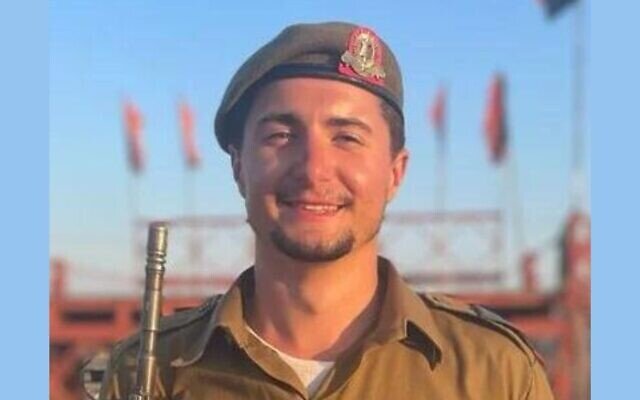When a convert stands in the mikvah about to immerse, undergo a radical transformation, and be born anew, the Beis Din asks a series of questions. One of the most poignant is one that long seemed to many of us to be an antiquated question: “You know that Jews have been subject to persecution, antisemitism, and attempted extermination throughout the millennia. If you become a Jew, you will join this hated, targeted people. Are you prepared to share in the destiny of the Jewish people both for good and for bad?”
At every single conversion I have had the privilege to be involved with, the candidate responded to this hypothetical question in the affirmative. Until recently, this question has felt like a technicality, something we must confirm in theory but would likely never be relevant in practice. After all, while joining the Jewish people means giving up cheeseburgers and bacon and other physical pleasures, it wouldn’t likely mean giving up one’s life.
On December 8th, Staff Sgt. Yonatan Chaim H”yd, 25, was killed fighting in Gaza. He died a Jew, but he wasn’t born that way. Yonatan Chaim, originally from Hilton, New York, was born Jonathan Dean, Jr. After studying the Holocaust in college, he converted to Judaism and in 2020 he moved to Israel. His cousin, Joelle Marie Muscolino, described him as “sweet, amazing, loving, smart, caring, talented, passionate, uniquely fabulous.” She said that he had “lived in Israel for a bunch of years now and had made it his home, a home where he was loved and celebrated for everything that he was, without judgement, to live freely and happily as Yonatan Chaim, just as his loving heart, soul, and body so deserved to…He felt compelled to protect Israel, the land who had given him so much, from the brutality of the terrorist, evil, savage attacks by Hamas and Islamic Jihadists. He died bravely fighting to defend Israel’s Democracy, the Jewish People that call her home just like he did, and for Judaism around the entire world.”
When Yonatan Chaim stood before the Beis Din to convert and was asked if he understood that by becoming a Jew he too would be the target of antisemitism, subjected to hate, he likely never dreamt how serious and real a question that would become, that it would in fact become for him a question of life and death.
Antisemitism is the world’s oldest hatred. It has existed since the inception of our people. In different generations it takes different forms, today manifesting in both its classic forms and in its expression as “anti-Israel” sentiment. For 2,000 years our enemies have sought our demise, they have systematically attempted to exterminate us and, aside from rare exceptions, for the most part we were passive victims and martyrs to their plots and plans.
But we are living in a new era, we are living with the miraculous modern State of Israel. No longer will our people go like sheep to the slaughter. No longer are Jews defenseless and helpless. Israel has one of the strongest armies in the world and like Staff Sgt. Yonatan Chaim, the selfless, brave and tenacious soldiers fight to defend not only our brothers and sisters in Israel, but Jews around the world.
As Purim approaches, a time ordinarily characterized by tremendous joy, happiness, and light, many are struggling with how to observe it against the backdrop of sadness and darkness as one war continues to rage on and another one looms. One of the specific questions that has arisen concerns dressing up as Israeli soldiers for Purim this year. On the one hand, what a demonstration of who our heroes are, what a way to show whom we admire, respect, and want to emulate. On the other hand, it might be perceived as insensitive that those who put on the uniform as a costume wear it for one day and have the luxury to take it off, while others must wear it for weeks or months on end, fighting in it and risking their lives in it on the front lines. It has further been suggested that yet another consideration for Americans might be the impression it could leave on our neighbors if we seem to be glorifying or celebrating war by “dressing up” in an army uniform.
Several years ago, in his responsa, She’eilas Shlomo (4:87), Rav Shlomo Aviner, Rosh Yeshiva of Ateret Cohanim and Rav of the community of Beit El, addressed the following question: Is it proper to recite the beracha of Shehechiyanu on purchasing a new gun? Rav Aviner provides a long Halachic explanation and defense of why he feels a shehechiyanu is warranted while conceding the need to own a gun is sad and unfortunate. His closing argument touched me deeply and I share his words with you:
The fact that we have guns shouldn’t elicit sadness that we still have wars and conflicts. Indeed, the opposite is true, it should elicit happiness that we have merited to be an am chofshi b’artzeinu (free nation in our homeland), that we have an established Jewish government, we have an army and a police force, that we are no longer the punching bag of the wicked nations, but rather we have the capacity to protect ourselves. Would it even occur to you that when the War of Independence began and we had weapons in our hands to defend ourselves after 2,000 years of Jewish blood being spilled freely, that one shouldn’t recite shehechiyanu with joy and gladness?! That joy continues to carry us and protect us from then until now. And for that reason, a Shehechiyanu should be recited when an Israeli soldier puts on his or her IDF uniform for the first time.
Rav Aviner ends his responsa by quoting his Rebbe, Rav Tzvi Yehudah Kook zt”l who wrote: “Fighting to protect our homeland is a mitzvah, the mitzvah of all Klal Yisroel. Therefore, everything connected with it, every gun and every weapon that is our response to our enemies, everything associated with establishing and protecting malchus Yisroel, Jewish sovereignty, it is all kodesh.”
Similarly, Rav Aharon Lichtenstein related that once when he returned to America and was visiting with his father-in-law, Rav Soloveitchik, he posed a series of questions from students who were serving in the IDF. One student worked in the tanks division and his job was cleaning out and maintaining the tanks. Often his uniform got covered in oil and grime and he wanted to know if he needed to change before davening Mincha, something that would be terribly inconvenient and difficult. The Rav looked at Rav Lichtenstein and wondered out loud, “Why would he need to change when he is wearing bigdei Kodesh (holy clothing)?”
I have heard from some in Israel who believe Americans should abstain from wearing an IDF uniform this Purim and I have spoken to others who think nothing would show more love, identification, and support. Each person and each community will decide for themselves but one thing should be clear: The IDF uniform is not simply a costume, and it should never be confused with a symbol of warmongering. It is the holy garb of a holy nation charged with a holy mission. It is worn by the defenders of a people that pray for peace more than any, by those who value and celebrate life more than any, who fight with a moral clarity and go to extreme measures to protect innocent lives, more than any other army or people.
We daven for the fulfillment of the words of our prophet Yeshaya: וְכִתְּת֨וּ חַרְבוֹתָ֜ם לְאִתִּ֗ים וַחֲנִיתֽוֹתֵיהֶם֙ לְמַזְמֵר֔וֹת לֹא־יִשָּׂ֨א ג֤וֹי אֶל־גּוֹי֙ חֶ֔רֶב וְלֹֽא־יִלְמְד֥וּ ע֖וֹד מִלְחָמָֽה׃, “And they shall beat their swords into plowshares and their spears into pruning hooks: Nation shall not take up sword against nation; They shall never again know war.”
But until then, Shehechiyanu v’kiymanu that we merit to live in a time that with the help and protection of Hashem, just like the Jews we will read about this week, we can fight for and protect ourselves.
















